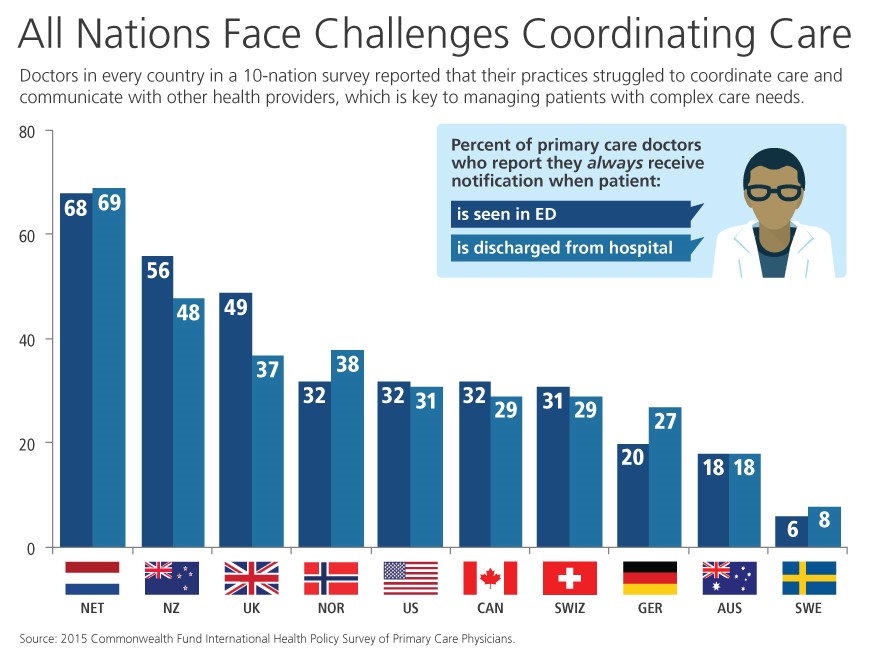Synopsis
Nearly one-quarter of primary care physicians in the United States report they are not prepared to care for the sickest and frailest patients, and 84 percent say they are not well prepared to manage patients with serious mental illness, according to a new 10-nation survey. The findings suggest the U.S. may need to do more to strengthen primary care and employ new ideas shown to be effective in other countries.
The Issue
Despite having a younger population than many other developed countries, the U.S. has a higher share of patients with multiple chronic conditions, severe mental illnesses, and other significant health care challenges. As a group, these patients account for a disproportionate share of health care spending, yet they do not fare well—in part because the nation’s primary care practices are ill prepared to meet their needs. The 2015 Commonwealth Fund International Health Policy Survey of Primary Care Physicians surveyed doctors in 10 countries to compare their experiences in providing care to patients with complex problems, using health information technology, and coordinating care outside of office settings, among other activities.
Key Findings
-
 Across the 10 countries surveyed, primary care doctors reported that their practices struggle to coordinate care and communicate with other health and social services providers.
Across the 10 countries surveyed, primary care doctors reported that their practices struggle to coordinate care and communicate with other health and social services providers. - Doctors also questioned their preparedness to care for patients with challenging issues such as dementia and severe mental illness, as well as those who need long-term home care or community-based social services. Doctors in Germany and the Netherlands were the most confident in their ability to meet these needs, with only 12 percent saying they felt unprepared.
- Within the U.S., 24 percent of primary care doctors said their practices are not equipped to manage care for patients with multiple chronic conditions, and 84 percent said they are not prepared for managing care of patients with severe mental health problems.
- In the U.S., only one of three primary care doctors (31%) said they were notified when a patient is discharged from the hospital or seen in an emergency department (ED). In the Netherlands, which does best in this area, 69 percent of doctors reported they were always notified at discharge.
- Across most countries, about half of doctors said their practices routinely coordinate care with home care providers. In the U.S., just over 40 percent reported communicating with social service providers on issues related to housing, meals, and transportation, compared with 65 percent of practices in the U.K.
- Slightly less than 40 percent of U.S. primary care doctors had made arrangements for patients to get after-hours care without going to the ED—the lowest rate in the survey. This contrasts with 94 percent in the Netherlands, 92 percent in New Zealand, and 89 percent in the U.K. Only 6 percent of physicians surveyed in the U.S. were able to make home visits, compared with more than 80 percent in the Netherlands and the U.K.
- Use of health information technology was a bright spot for the U.S. Use of electronic health records (EHRs) has tripled since 2006. Fifty-seven percent of U.S. primary care practices reported communicating with patients via email and 60 percent allow patients to access their medical record electronically. Only 52 percent of doctors reported being satisfied with their EHRs, however.
The Big Picture
While U.S. primary care practices lag some other countries in their readiness to manage the care of high-needs patients, the Affordable Care Act has introduced provisions that encourage the health care industry to invest in new ways of providing and paying for health care, such as medical homes and accountable care organizations. These efforts are nascent, however, and delivery systems have been slow to respond to them, the authors note.
About the Study
Researchers analyzed survey responses from more than 11,000 primary care doctors in Australia, Canada, Germany, the Netherlands, New Zealand, Norway, Sweden, Switzerland, the United Kingdom, and the United States. Response rates ranged from 19 percent in Germany to 47 percent in Sweden.
The Bottom Line
To ensure affordable, high-quality health care for sick and complex patients, the U.S. must strengthen its primary care infrastructure. This includes making it easier for patients to get care on nights and weekends, facilitating communication among providers, and enabling access to social services.



